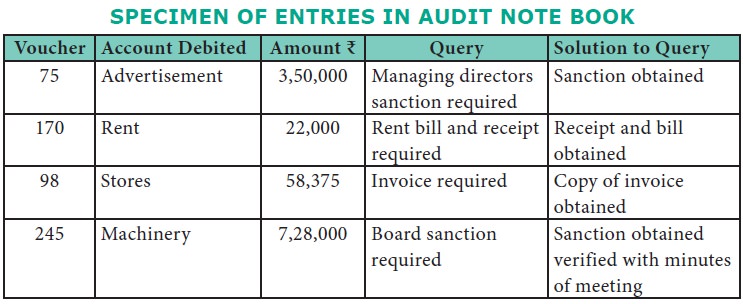Meaning, Definition, Example, Contents, Benefits (or) Advantages, Disadvantages | Auditing - Audit Note Book | 11th Auditing : Chapter 5 : Documentation
Chapter: 11th Auditing : Chapter 5 : Documentation
Audit Note Book
Audit Note Book
Meaning
Audit Note Book is a register maintained by the
audit staff to record important points observed, errors, doubtful queries,
explanations and clarifications to be received from the clients. It also
contains definite information regarding the day-to-day work performed by the
audit clerks. In short, audit note book is usually a bound note book in which a
large variety of matters observed during the course of audit are recorded. The
note book should be maintained clearly, completely and systematically. It
serves as authentic evidence in support of work done to protect the auditor
against any legal charge initiated against him for negligence. It is of immense
help to the auditor in preparing audit report. It also acts as a valuable guide
for conducting audit for future years.
Example:
Following are the queries made in the
Audit Note Book:
1. Voucher No.75 Paid towards
advertisement expenses for Rs. 3,50,000.
2. Voucher No.170 Rent paid Rs. 22,000.
3. Voucher No.98 Material purchased
and received in Stores for Rs. 58,375
4. Voucher No.245 Machinery
purchased for Rs.
7,28,000.
Contents of Audit Note Book
The following matters should have been incorporated
in an Audit Note Book.
1. A list of the account books normally used and
maintained.
2. Names of the principal officers, their duties
and responsibilities.
3. Nature of business carried on and important
documents relating to the constitution of business like
Memorandum of Association, Articles of Association,
Partnership deed etc.,
4. Extracts of minutes and contracts affecting the
accounts.
5. Extracts of correspondence with statutory authorities.
6. Copy of audit programme.
7. Accounting methods, internal control and
internal check system in operation.
8. Routine queries like missing receipts and
vouchers etc.
9. Details of errors and frauds discovered during
the course of audit.
10. Points to be included in audit report.
11. Details of all important information to be used
as reference for future audits.
12. Date of commencement and completion of audit.

Advantages of Audit Note Book
1.
Facilitates
Audit Work: It facilitates the work of
an auditor as all important details about the audit are recorded in the note
book which the audit clerk cannot remember everything at all the time. It helps
in remembering and recalling the important matters relating to the audit work.
2.
Preparation
of Audit Report: Audit note
book helps in providing required data for preparing the audit report. An
auditor examines the audit note book before preparing and finalizing the audit
report.
3.
Serves as
Documentary Evidence: Audit
note book serves as a documentary evidence in the court of law when a suit is
filed against the auditor for his negligence.
4.
Serves as
a Guide: When a audit assistant is
changed before the completion of audit work, audit note book serves as a guide
in completion of balance work. It also acts as a guide for carrying on
subsequent audits.
5.
Evaluating
Work of Audit Staff: It helps
to assess the work performed by the audit staff and helps in evaluating their
level of efficiency.
6.
Fixation
of Responsibility: Audit note
book helps in fixing responsibility on concerned clerk who is responsible
for any undetected errors and frauds in the course of audit.
7. No Dislocation of Audit Work: An audit note book contains all important
details about audit hence any change in the audit staff will not disturb or
dislocate the audit work.
Disadvantages of Audit Note Book
1. Fault-finding Attitude: It
leads to development of a
fault-finding attitude in the minds of the staff.
2. Misunderstanding: Very often maintenance of audit note book creates misunderstanding between
the client’s staff and the audit staff.
3. Improper Preparation: Since
it serves as evidence in the court
of law, it needs to be prepared with great caution. When the note book is
prepared without due care it cannot be used as evidence against the auditor for
negligence.
4. Adverse Effects on Subsequent Audits: Since
audit note book is used in
performing subsequent audits, any mistakes in the note book may have adverse
impacts on the next audit.
Guidelines and Standards issued by The Institute of Chartered
Accountants of India (ICAI)
1. AS – Accounting Standards
2. AAS – Auditing and Assurance
Standards
3. International Standards on
Auditing (ISA) was issued by the International Auditing and Assurance Standards
Board (IAASB) which was later modified as Standard Auditing Practices (SAP) by
the Institute of Chartered Accountants of India.
Related Topics